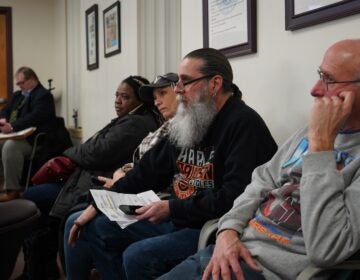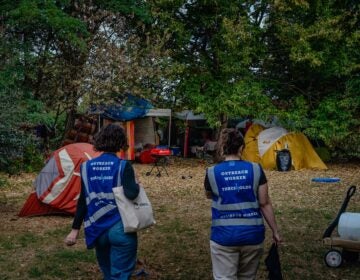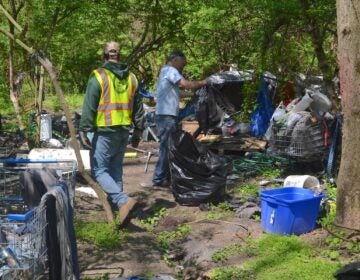Protest encampment residents say they’re not leaving Parkway, despite city deadline
Residents of the camp on Benjamin Franklin Parkway say they won’t move unless Philadelphia provides them with permanent housing.
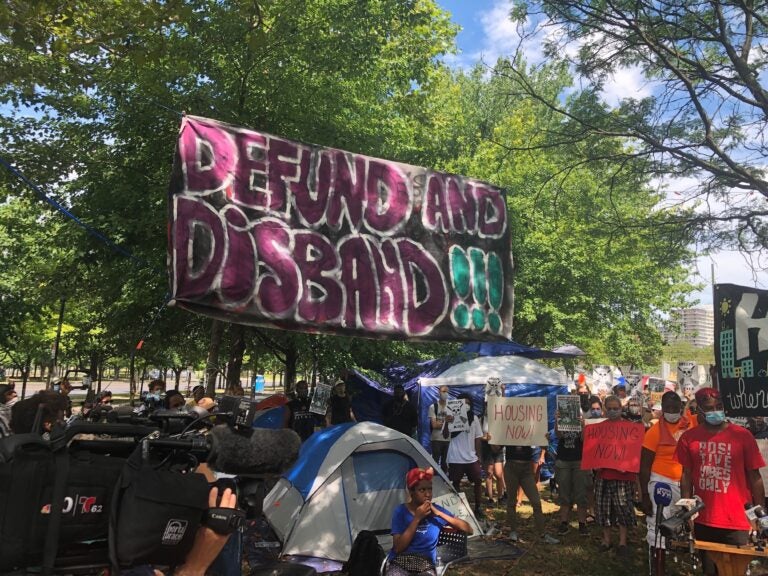
Residents of a homeless encampment on the Ben Franklin Parkway rally against the city’s order that the encampment be cleared by Friday. (Susan Phillips/WHYY)
A group of people experiencing homelessness, now living at an encampment on Benjamin Franklin Parkway, say they’re staying put, despite a city order to dismantle the tents by Friday morning. At a press conference at the site Monday, hundreds of the camp’s residents and their supporters chanted “Housing Now,” and said they had no plans to leave until they were given permanent housing.
“Make no mistake, this is a homeless encampment, this is a protest,” said Jen Bennetech, of the group Occupy PHA. “But what this really is is a civil war between the poor and Black citizens of Philadelphia and the city.
About 150 people are currently living on land that typically serves as a ballfield. The site includes a kitchen, a generator, hand-washing stations and a shower. The protest began with a handful of tents at the beginning of June, but quickly grew to more than 200 after donations poured in and volunteers began providing food, water and medical care.
“From here on out, we don’t want any services from the city, unless it’s housing,” said Bennetech. “We don’t want your water, we don’t want your outreach, defund the Office of Homeless Services.”
The protesters have also taken aim at the Philadelphia Housing Authority, which oversees subsidized public housing, including scattered site housing as well as developments.
Bennetech faults PHA for failing to rehab empty housing stock the federal agency owns throughout the city. A separate protest encampment exists on an empty lot next to Housing Authority headquarters in North Philadelphia. And to reduce the number of people on the Parkway, residents created a third encampment in Fairmount Park.
City officials say they have no control over PHA, or federal housing policy. And while the city has been meeting with camp residents for the past four weeks, residents have not met with PHA officials.
Negotiations between camp residents and the city broke down last week.
The city says it offered to speed up plans to build a tiny-house village, which would consist of permanent one-room houses where residents shared a common kitchen and bathroom. City officials say they also agreed to develop individual housing plans for all the residents at the Parkway site, and work to create a sanctioned encampment elsewhere in the city.
But residents of the camp rejected those plans, saying they want permanent housing.
At a press conference Friday, Eva Gladstein, deputy managing director of the city’s Department of Health and Human Services, said she was hopeful that camp residents would leave voluntarily. Gladstein said the city plans to have outreach workers at the site this week.
“And we hope, through that engagement, that people will be connected to housing resources or any other resources that they might need,” said Gladstein.
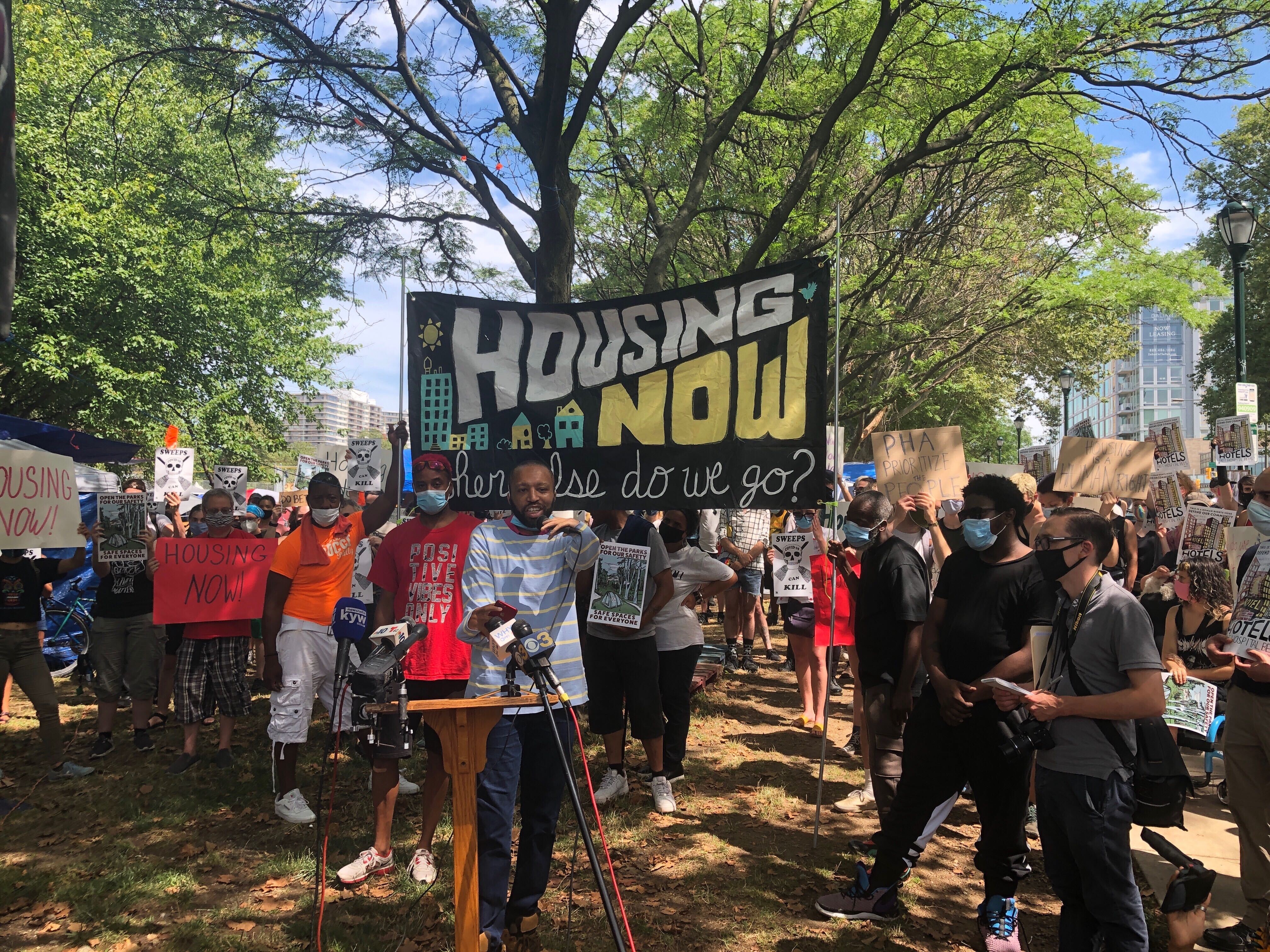
What if the deadline is not met?
Asked whether officials had ruled out using the police to force camp residents to leave, Gladstein said the city had not made a decision on what to do if some refused.
She said the city has shelter beds available. But the residents of the camp say shelters are dangerous and not a solution.
“The city needs to take responsibility,” said Jeremy Williams, a resident of the encampment. “What they are [offering] us is already in place. We’re asking for permanent housing.”
Williams said it’s difficult to maintain a job when you are homeless and lack access to showers and clean clothing, and have to figure out each day how to get food and water. Living at the encampment has allowed him to hold down a job, he said. He also manages tent distribution.
“We’re doing the city’s job,” said Williams. “How do you have people, who have built this establishment for only a month doing, more than what the city has done in the last 13 years?”
Williams said his experience with the shelter system, and waiting in line for permanent shelter, was rife with red tape and delays.
“They kept giving me the runaround,” he said. “Go do this, go get that, every time it’s additional paperwork. But I don’t want to live in the middle of a baseball field my whole life. Nobody wants to live on a baseball field their entire life.”
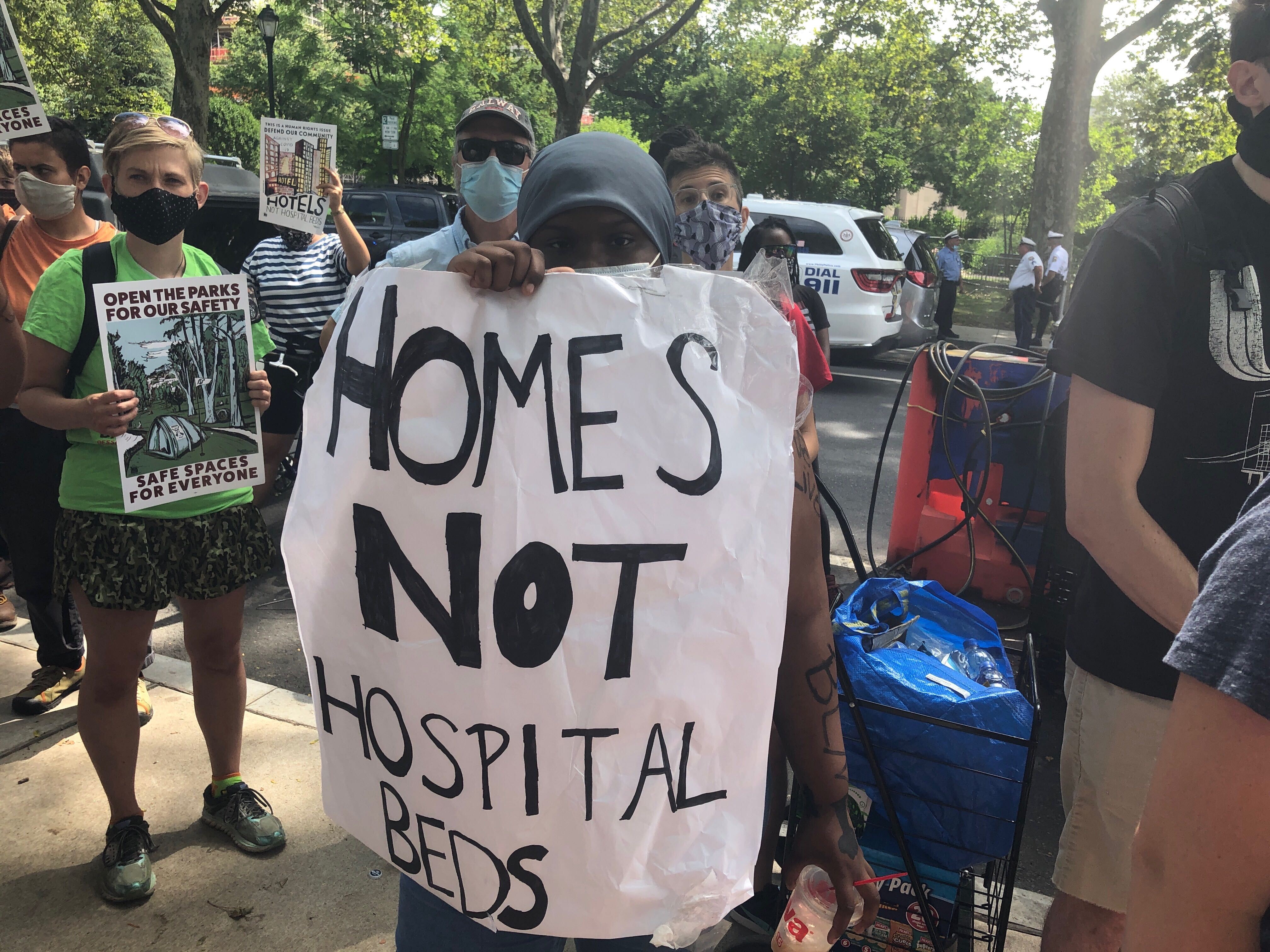
The protesters have called for defunding the city’s Office of Behavioral Health, as well as the Office of Homeless Services.
Liz Hersh, who runs the Office of Homeless Services, said she respects the protesters for raising awareness of housing inequities, but there are limits to what the city can do in a short timeline.
“We need more voices like theirs, and we need them in it for the long haul,” Hersh said at last week’s press conference. “There’s a million things I would like to be different, more housing for homeless people being at the top of the list. What we are really hoping comes out of this is doing the really hard work of creating the political will to get the resources we need, not just locally, but at the state and federal levels. They’re right about that.”
Neighborhood organizations have pressured the city to act, saying they need the ballfield back so children can resume playing T-ball and baseball. The Logan Square Neighbors Association submitted a petition to the city several weeks ago, asking it to dismantle the camp, citing the build-up of trash, lack of sanitary facilities, and the need for the children to use the ballfields.
Gladstein says the federal government needs to step up and provide more resources for cities like Philadelphia to address housing issues. Federal officials say the protesters have pointed the finger in the wrong direction.
Kelvin Jeremiah, director of the Philadelphia Housing Authority, said his agency has made progress in the Sharswood section of the city, working with the neighborhood’s residents to redevelop vacant land. He said that many of the vacant properties PHA oversees are not fit for habitation, and that the agency is prevented from simply turning them over to a community land trust, which the protesters have demanded.
“We have been working with the city and CDCs [community development corporations] to rehab them, and we are willing to transfer some of those units to the city’s landbank if we can meet regulatory requirements,” said Jeremiah. “So that’s something we’ve already been embarking on. But we are concerned about the safety of those units.”
Bennetech said several families have already fixed up and are living in PHA houses across the city.
At the encampment on the Parkway, not all the residents say they want to stick around past the city’s deadline.
“I’m outta here,” said Jose Alicea. “I’m going back to where I was before, in Chinatown. I’ll be fine there.”
He said there’s no way he’d ever go to a shelter.
 WHYY is among more than 20 news organizations producing Broke in Philly, a collaborative reporting project on solutions to poverty and the city’s push towards economic justice. Follow us at @BrokeInPhilly
WHYY is among more than 20 news organizations producing Broke in Philly, a collaborative reporting project on solutions to poverty and the city’s push towards economic justice. Follow us at @BrokeInPhilly
WHYY is your source for fact-based, in-depth journalism and information. As a nonprofit organization, we rely on financial support from readers like you. Please give today.



